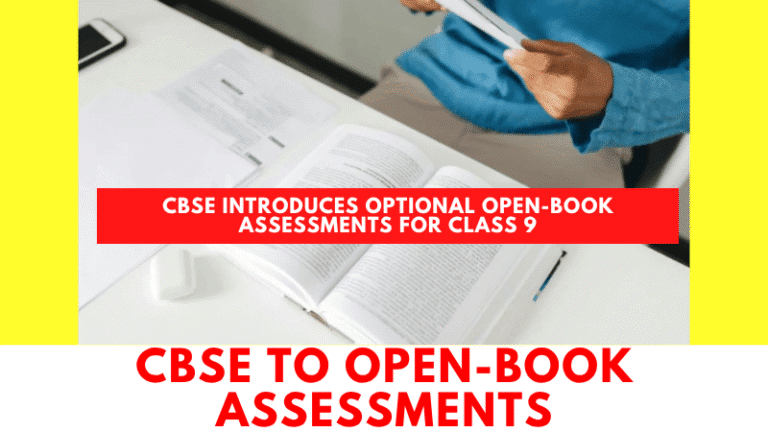CBSE introduces optional open-book assessments for Class 9: The Central Board of Secondary Education will allow schools to adopt open-book assessments for Class 9 beginning in the 2026-27 academic session. The move, approved by the board’s Governing Body in June, is intended to shift assessment focus from rote memorisation to competency and application, in line with the National Curriculum Framework for School Education 2023 and the National Education Policy 2020.
Key highlights: open-book assessments will cover core Class 9 subjects including language, mathematics, science and social science; participation is optional for schools; assessments will be part of the three pen-and-paper tests held each academic term; CBSE will provide standard sample papers, guidelines and training to support implementation. The decision follows a pilot study and builds on earlier CBSE experience with open text-based assessments.
| Item | Details |
|---|---|
| Policy change | CBSE to introduce Open-Book Assessments for Class 9 |
| Start of implementation | Academic session 2026-27 |
| Scope | Core subjects: language, mathematics, science, social science |
| Participation | Optional for schools; CBSE will offer guidelines and support |
| Assessment format | Open-book assessments during the three pen-and-paper tests each term |
| Pilot background | Pilot project run earlier; pilot approved in December 2023 |
| Past experience | Open Text-Based Assessment introduced in 2014 and discontinued in 2017-18 |
| Support for schools | • Standardised sample papers • Comprehensive guidelines • Teacher training and structured guidance |
| Expected benefits | • Emphasis on critical thinking and application • Reduced rote memorisation |
| Important caveats | • Pilot showed performance range from 12% to 47% in some tests • Success depends on training and resource use |
| WhatsApp Official Channel | Join WhatsApp Channel |
| Telegram Official Channel | Join Telegram Channel |
What the new open-book approach means for Class 9 teaching and learning
Open-book assessments let students refer to textbooks, class notes and approved resources during tests. The intention is to encourage problem solving, interpretation and application of knowledge rather than recall. Schools that adopt the format will need to change classroom practice so students learn to locate, evaluate and apply information effectively during timed assessments.
What the pilot found and how CBSE plans to address challenges
CBSE’s pilot study showed mixed outcomes, with student performance in pilot assessments ranging between 12 and 47 percent. The trial highlighted practical issues such as completion time and how well students used resources under exam conditions. Teachers who participated in the trial reported optimism about OBAs improving higher-order thinking, but the board notes successful rollout will require clear specimen papers and teacher training to help learners use reference material productively.
How schools will be expected to implement open-book tests
CBSE will make adoption optional and provide structured support. Key implementation elements announced include sample question papers aligned to OBA format, operational guidelines for conducting the tests, and training modules for teachers. Schools choosing to implement OBAs should: prepare students in classroom activities that practise reference-based problem solving; allocate time in internal assessments to simulate the OBA environment; and ensure that only approved resources are permitted during exams.
What students and parents should prepare for now
Students should begin shifting study habits from memorisation to understanding concepts and practising application. Parents and schools should support this transition by encouraging use of notes and reference materials during practice tests and focusing on question types that require analysis and reasoning. Because adoption is optional, families should check with their school whether OBAs will be used in internal assessments for 2026-27.
CBSE will publish detailed sample papers, subject-specific guidelines and training schedules before the policy rollout. Schools and stakeholders should monitor official CBSE channels for the final operational guidance and materials.

